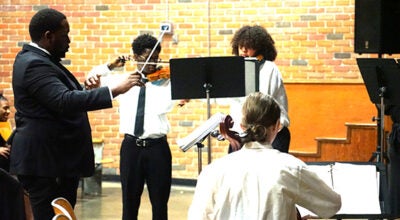Instructor discusses gun law, safety
Published 12:10 am Thursday, July 25, 2013

Jay Sowers / The Natchez Democrat — NRA certified Concealed Carry Instructor John Fontenot talks about the importance of situational awareness while speaking to members of the Rotary Club of Natchez on Wednesday afternoon. Just as he does during his concealed carry classes, Fontenot stressed that using a firearm is a last resort, and that being aware of one’s surroundings is the most important way to stay safe.
NATCHEZ — As Mississippi’s courts decide the fate of a new law aimed at clarifying a citizen’s right to openly carry a weapon, Natchez Rotarians learned Wednesday about firearm safety and basics of what the current law allows and prohibits.
National Rifle Association certified instructor John Fontenot walked club members through a portion of the nine-hour presentation he administers for concealed carry training.
The presentation covered the responsibilities of gun ownership, proper gun storage and the basics of pistol shooting.
Fontenot was invited to speak by United Mississippi Bank Chief Financial Officer Adrian Sandel, who said he hoped to educate residents and business owners on what exactly the new law means for everyone.
“Whatever your opinion is on the situation, I think it’s important that we all be educated especially as business owners and business managers,” Sandel said. “I know we as a bank have been scratching our heads a great deal lately (about) what to do … and how to handle people with weapons in our locations.”
Earlier this year, legislators passed and Gov. Phil Bryant signed House Bill 2, which aimed to clarify how to define what constitutes a concealed weapon and what constitutes a weapon carried openly. The open-carry law was supposed to go into effect July 1, but Hinds County Circuit Judge Winston Kidd ruled the law was unconstitutionally vauge July 12, putting it was on hold until the Legislature clarifies it.
Fontenot said he preferred not to discuss specifics of the new law because his comments could be misconstrued as fact or law instead of his opinion. He did say that Mississippi is part of a large group of states that allow open carry if the law goes into effect.
“There are 44 states in the U.S. that have open carry, and it will become 45 next month when Arkansas’ law goes into effect,” Fontenot said. “We need to preserve the rights that we have in this country and hang on to those rights.”
Under present law, with some exceptions, Mississippians have long been able to carry a weapon that is fully visible. And any citizen without a felony record can apply for a concealed-firearms permit.
The legal difference between carrying a concealed firearm and a partially concealed one is that the former requires a permit, and the latter does not. Under the new law, a weapon would be considered openly carried if any part of it is plainly visible, or if someone was carrying it in sheath or holster. For example, someone without a concealed weapon permit could carry a gun in the waistband of his pants or in their coat pocket as long as part of it wasn’t “hidden or obscured from common observation.”
Weapons would still be prohibited on school campuses, in university stadiums and in courtrooms. Private property owners also can ban weapons from their premises by posting signs stating their policy. Attorney General Jim Hood wrote an appeal to the state Supreme Court Monday saying that those seeking to overturn the law were trying to use the courts to change a policy with which they disagree with.
“Each day that House Bill 2 remains enjoined irreparably harms the state of Mississippi by denying the citizens the benefit of policies deemed to be in the best interest of the state by the Legislature,” Hood’s office wrote. “Each day the law remains enjoined threatens citizens with criminal arrest for actions not deemed to be a crime by the Legislature.”





